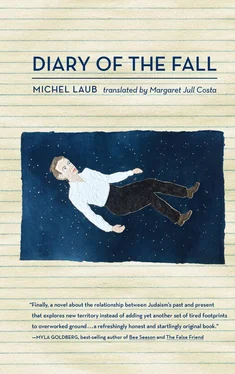From my father I inherited the color of his eyes (brown and slightly yellow on very bright days), the reading habit (fiction in my case, nonfiction in his), a few favorite foods (barbecued meat, melted cheese, rice mixed with gravy and egg yolk). I’m stubborn like him too. Learning that he had Alzheimer’s was the only moment in my forty years when I really thought about stubbornness, if you can call it that, and if you can credit it with the fact that I’ve reached the age of forty having told my father most of my stories, every decision I made about what seemed important at the time, renting an apartment, choosing a profession, changing careers and cities, the beginning and end of two marriages, the books I’ve written and the things I’ve most enjoyed and whatever else I can fit into a weekly phone call to Porto Alegre summarizing what I believe he needs to know, at least in the sense of distracting him and distracting myself so that neither of us will need to say anything about the fact that from then on that’s pretty much how it will be, a half-hour chat each week and a couple of visits a year, when we’ll spend a brief, pleasant day pretending that time hasn’t passed, and that it will always be possible for me to continue hiding from him my most important secret, which in some way has always defined who I am, and in some way too can only be explained by a concept — a truth or a lie or both things, depending on how you react to a scene like that of my grandfather slumped over his desk.
1.
My favorite drink used to be whisky. At one time it was vodka. And I went through a lot of different cocktail phases: Bloody Mary, dry Martini, mojito. Over the years, I developed a particular intolerance for champagne. I like beer, but not in large quantities. I was never keen on liqueurs. The same goes for any drink that tastes like syrup, Campari or Underberg for example, or drinks made from aniseed: I have a particular intolerance for anything that tastes of aniseed.
2.
Wine is good. I haven’t drunk Steinhäger in ages. I’m not a fan of straight rum. And I rarely drink cachaça . I like cognac. Gin. Bourbon. Pisco. Punch. Sangria. Sake. Tequila. Port wine. Single malt. Hi-fi. Mint julep. Sea breeze. White Russian. B52. Jumping monkey. Alexander. Sex on the beach. Piña colada.
3.
The first sign that you have a drinking problem is the fact that half of your conversations revolve around the subject, and 90 percent of those conversations revolve around the fact that you no longer drink as much as you did, and you can spend years saying that, yes, you did go through a really rough patch but you’ve sorted yourself out now and you go to bed early and you’ve taken up sport, and how dangerous it is to drive around the way you used to do, and you really thought you’d never reach forty if you carried on like that, and you say this in the same tone of voice as those people who always have some tale to tell about an incident in a bathroom or in the gutter or at a birthday party where you astonished everyone by walking through a glass door and emerging with just a tiny cut on your nose, but when you’ve been married three times and are just about to leave your third wife it’s really not that funny anymore.
4.
I woke up with a stiff neck and in broad daylight. It wasn’t until after seven o’clock that I realized I’d spent the whole night in the park. The envelope containing the results of my father’s tests was still intact, and at a moment like that you don’t think about turning over and sleeping a little longer or getting up and heading for a newspaper stand or a café where you can order a coffee and give instructions on when exactly your toast should be removed from the grill. You don’t think about anything, you just need to carry out those tasks one by one, each bite, each sip, taking care not to burn your tongue, the visit to the toilet to wash your face, the bill paid with your debit card, and two years later I know that the instant I opened my eyes that day things had already changed, it was the first morning I’d woken up with an awareness that I had responsibilities, how my father would spend his days and who would look after him.
5.
My father started writing his memoirs immediately after finding out that he had Alzheimer’s. I never asked him why, not just because I didn’t want to interfere in such a healthy activity for someone in his position, but because, given the way he wrote and what he wrote, its significance was fairly obvious.
6.
I had already noticed her at the beach. I asked her: Doesn’t your family usually holiday in Capão? Where are you staying? Where do you sit on the beach? I enjoy swimming in the sea and in the heated pool too. At the same time, I was waiting for the next piece of music to begin. When it did I would ask her to dance. It was dark in the hall. In the far corner, the organizers had hung a spinning, glittering globe. I knew half the people there. They knew me too, I think. Everyone was looking at me. Men had to wear a tie in those days. There wasn’t a man in the room who wasn’t wearing a tie .
7.
Perhaps my father thought of it as a kind of exercise for the brain, the equivalent of a crossword, each sentence helping to prolong his memory of things, like taking notes in class which, when you study them later, become everything the teacher said, but I don’t really believe that. That’s no reason to write a book of memoirs, knowing that in the future an illness will prevent you reading it, unless you’ve reached the point my grandfather reached when he wrote his.
8.
My father spoke about my grandfather’s death only once, after the fight we had when I was thirteen, but that was enough for me to imagine what it must have been like for him to open that study door when he was fourteen, the moment before he took a step and went over to the desk. I never asked him what was on the desk, papers, pens, or if my grandfather had left a note or taken the trouble to cover the carpet with something or to position himself so that his blood wouldn’t spatter the wall, and if they had to get a decorator in afterward and agree on a price and pretend that the stain had been caused by an accident at a party, someone tripping and spilling their glass of wine, and that no one was hurt or found their life changed for ever.
9.
I imagine my father when he was fourteen, sixteen, eighteen, his days divided between school and the shop, the silent suppers with my grandmother, his course in business studies, a few friends, a few girlfriends, and the dance where he met my mother. As he got to know my mother better, I can’t believe that the Sunday morning when my grandfather died didn’t cast a shadow over their relationship. Not just in the way one would expect, the inevitability of that ending when one considers the life my grandfather had known, his memoirs, and forgive me for returning yet again to the subject and mentioning that word Auschwitz yet again, and yet again evoking its meaning, but also as regards their future together.
10.
Forgive me if I say again that Auschwitz helps to justify what my grandfather did, if I find it easier to blame Auschwitz than to accept what my grandfather did, if I feel more comfortable continuing to list the horrors of Auschwitz, because I have a sense that everyone’s rather tired of hearing about that, and the number of Auschwitz survivors who ended up exactly like Primo Levi and my grandfather, I once read a long report on the subject, someone in Mexico, someone in Switzerland, in Canada, in South Africa, and in Israel, a brotherhood of ninety-year-old gentlemen who lived alone in a room in some boardinghouse, an epidemic of ninety-year-old gentlemen in a city and in a country and in a world where they knew no one and where no one remembered anything anymore, and forgive me if thinking about this is simpler than indulging in an obvious exercise: imagining that my grandfather didn’t do what he did just because of Primo Levi and those other gentlemen, or because he was like Primo Levi and those other gentlemen, or because he didn’t know how to avoid ending up like them, but for some reason closely bound up with my father.
Читать дальше












